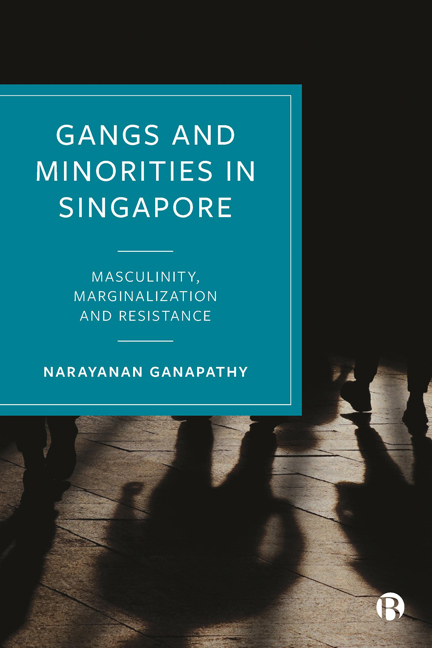Book contents
- Frontmatter
- Contents
- List of Figures
- List of Abbreviations
- Glossary of Non-English Terms
- About the Author
- Preface
- 1 Introduction: Framing the Study
- 2 Omega as Organized Crime?
- 3 Racial Minorities and Crime
- 4 Methods of Study
- 5 The Rise of Omega
- 6 Fearless and Fearsome
- 7 The Omega Wave: The ‘Triadization’ of Omega
- 8 Conclusion: Law, Drug Crimes and Marginality
- Notes
- References
- Index
7 - The Omega Wave: The ‘Triadization’ of Omega
Published online by Cambridge University Press: 28 March 2024
- Frontmatter
- Contents
- List of Figures
- List of Abbreviations
- Glossary of Non-English Terms
- About the Author
- Preface
- 1 Introduction: Framing the Study
- 2 Omega as Organized Crime?
- 3 Racial Minorities and Crime
- 4 Methods of Study
- 5 The Rise of Omega
- 6 Fearless and Fearsome
- 7 The Omega Wave: The ‘Triadization’ of Omega
- 8 Conclusion: Law, Drug Crimes and Marginality
- Notes
- References
- Index
Summary
This chapter continues the discussion on the paradoxical nature of a hybridized masculinity pursued by members of the Omega gang. While the previous chapter illustrated how they adopted a protest stance through violence to counter and resist what they considered to be Chinese hegemonic masculinity, this chapter charts how Omega members appropriated Chineseness that centred on notions of consumerism, economic success and competitiveness, pragmatism and the principle of guanxi (social connections) to challenge Chinese dominance of the criminal underworld. In other words, Omega members emulated Chineseness to challenge Chinese control of the criminal underworld (Ganapathy and Balachandran, 2019). Omega’s appropriation of money success – an organizational goal that is accepted as quintessentially Chinese – saw immense returns for the gang in terms of human, social, symbolic, reputational and, not least, money capital. Upon their release from prison, Omega members used ‘convicts as a reference group’ to influence the culture of free society and in the process shape the religious, racial, political and criminogenic ideologies of their ethnic peers (Irwin and Cressey, 1962: 154). Prison sociologists have long observed that prison gangs play a significant role in exporting prison subculture and values, acting as a conduit for inmates’ internalization of both the prison’s and the gang’s value systems (Laub and Sampson, 1993). Pyrooz et al’s (2017) argument for treating prison gangs and street gangs as symbiotic rather than purely dichotomous entities finds a compelling case in the analysis of the Omega gang, where shared racialized experiences before and during incarceration shape and bound minority Malay Muslims to this symbiosis between the prison and the streets. When Omega members were released from prison, the gang’s presence, and therefore its membership, expanded onto the streets and then back in the prisons, as those members were re-arrested. Omega’s presence and dominance among the prisoner population allowed it equal say, alongside the Chinese secret societies, in the co-creation of the rules of the game that affected the criminal underworld of the free society, a pattern of informal social control that has been observed consistently with prison gangs elsewhere (Skarbek, 2012, 2014; Pyrooz and Decker, 2019).
What the Omega gang did, upon exportation to the free society, was to ‘corporatize’ itself (Taylor, 1990).
- Type
- Chapter
- Information
- Gangs and Minorities in SingaporeMasculinity, Marginalization and Resistance, pp. 136 - 158Publisher: Bristol University PressPrint publication year: 2023



